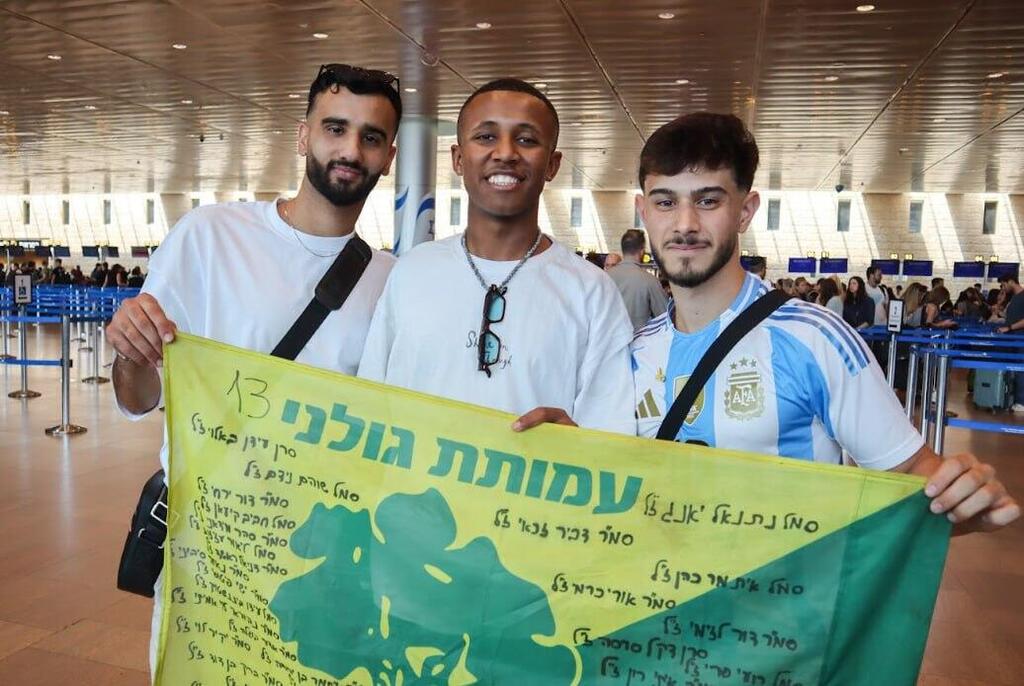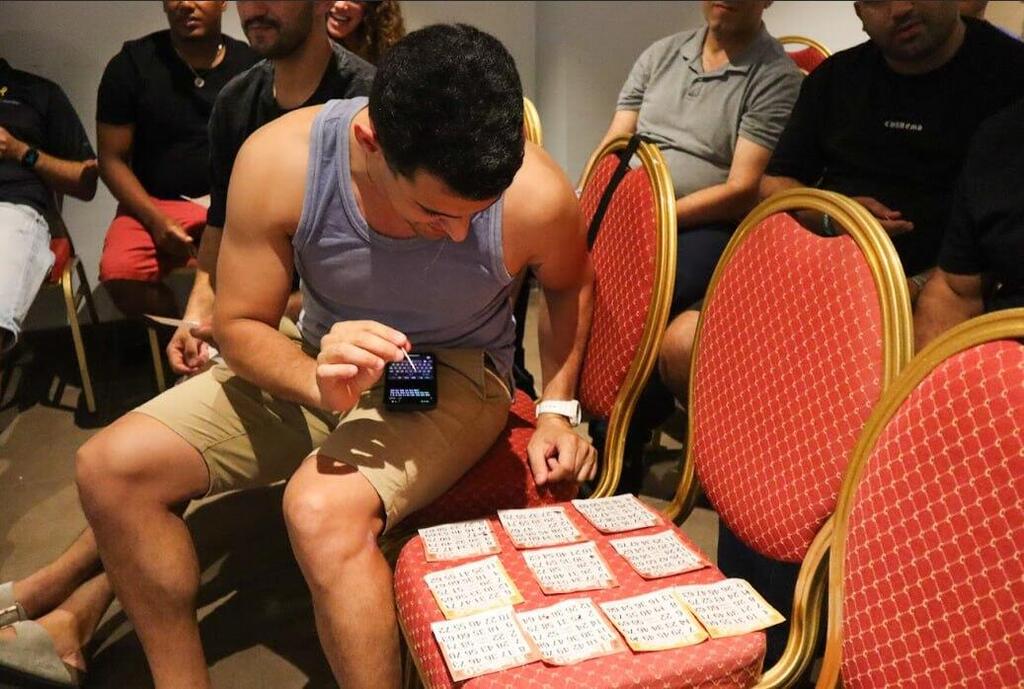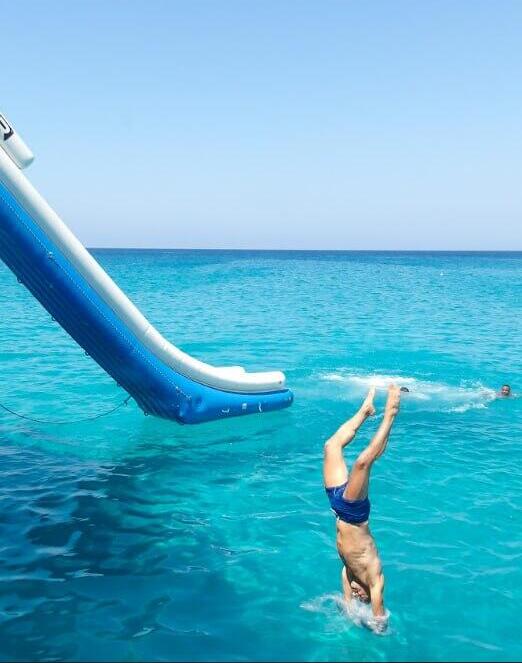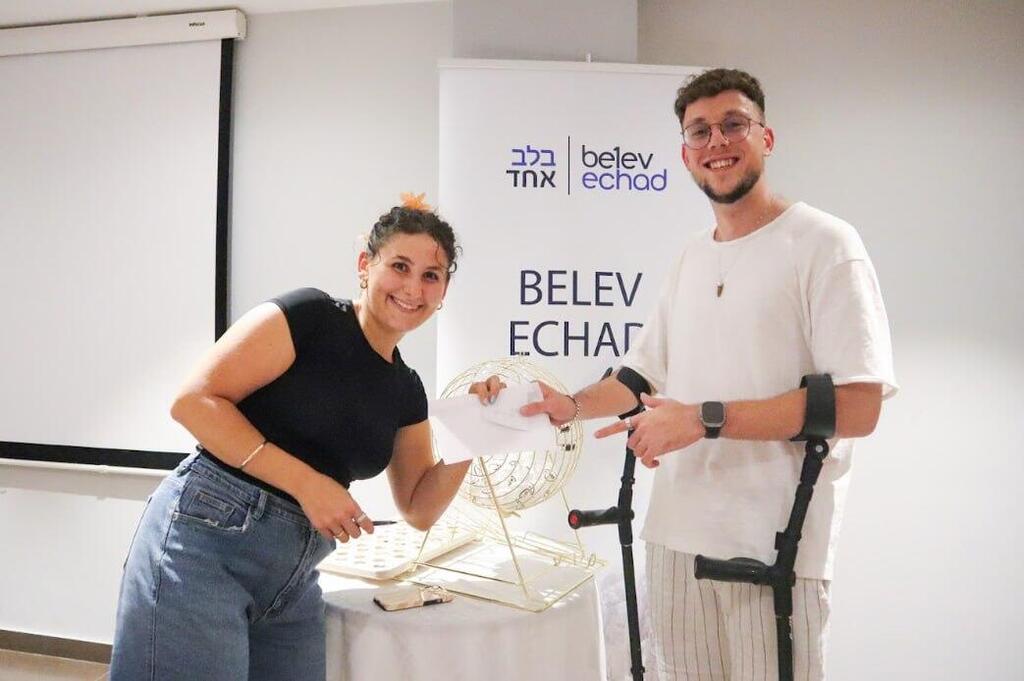Getting your Trinity Audio player ready...
Since the October 7 Hamas terrorist attack on southern Israel, Israeli security forces have faced significant predicaments, both on and off the battlefield. These brave men and women have endured severe injuries, ranging from gunshot wounds and shrapnel injuries to traumatic limb losses and psychological scars. Their road to recovery is arduous, involving extensive medical treatment, physical rehabilitation and psychological support.
Belev Echad, founded in 2009, has been a lifeline for many IDF veterans. Through communal efforts and specialized programs, these wounded heroes receive the necessary tools and encouragement to rebuild their lives and regain their sense of purpose and well-being. The retreat in Paphos is one of the many ways Belev Echad helps veterans reconnect with life and each other.
I met the group at Ben Gurion Airport, where I noticed some participants were missing limbs, while others used crutches and wheelchairs. Some were carrying scars from the battlefield. Despite their visible injuries, they all had big smiles and a strong aura of optimism and joy radiating from them. This spirit set the tone for the retreat.
After a short flight to the neighboring island nation, we arrived at the beachfront Blue Lagoon Kosher Hotel. We enjoyed a marvelous kosher dinner, followed by a special game of bingo into the night with exciting prizes, including PlayStation 5 consoles, electric scooters, a couples' massage and various other cool rewards.
The next day, a Friday, at breakfast, I sat with some of the participants, some of whom have been with Belev Echad for years. They sadly noted the influx of new, younger faces since the war began. We then boarded a bus for a cruise on the famous Blue Lagoon. With loud Israeli music played by an Israeli DJ, we splashed in the azure waters and enjoyed a fun afternoon swim.
Later, we went to an authentic Greek tavern and were treated to a delicious fish and chips course. We returned to the hotel for a brief rest before a Kabbalat Shabbat service.
Cruising on the Blue Lagoon
(Video: Belev Echad)
I approached the participants, inquiring if they wished to share their stories. Some expressed that they were not yet ready to discuss their experiences, while others said they already felt deep interview fatigue. Respecting their boundaries, I refrained from pressing further.
I met Daniel Verkh, 20, from Petah Tikva, who served in the Golani Brigade’s 13th Battalion and was injured on October 7 and agreed to talk to me.
"I spent that Shabbat with my entire platoon at a small outpost called Tzakam," he recalls. "We were on alert with tanks and a small armored unit. That morning, we woke up at 5:30, and by 6:25, everything erupted into chaos."
Daniel and his team immediately moved to Kibbutz Nir Am. "At first, it was quiet, though we could hear gunfire in the distance," he explains. "Then, six pickup trucks and several motorcycles ambushed us. Two of my teammates were half-exposed on the vehicle's hatches and engaged in a firefight. When a bomb disabled our vehicle, one of my comrades, Matan Abargel, of blessed memory, ran out of ammunition and swapped places with another soldier, who got shot in the shoulder. I, being a medic, immediately started treating him."
Amid the chaos, a stun grenade was thrown into their vehicle. "The grenade exploded, leaving us disoriented for 30 to 40 seconds. Despite the confusion, I continued treating my injured comrade. Then, I saw Matan handling a live grenade that had been thrown at us. He shielded us from the blast, sacrificing himself. I tried to pull him away, but the grenade exploded, injuring us all."
When Daniel regained consciousness, he found himself covered in blood with Matan lying on top of him, severely wounded. "I told Matan to move so I could breathe, but realized he was gravely injured. Despite my efforts, I couldn’t save him. He spent his last moments trying to protect us, saying he was saving his team and the people of Israel."
As the team grappled with Matan’s loss, another gas grenade was thrown inside, causing severe choking and tears. "We thought we wouldn't make it out alive. Suddenly, I remembered the emergency hatch on our vehicle. We forced it open, allowing the gas to escape and giving us a chance to breathe."
'Talking about my experiences helped me heal. But even recently, I had a rough day where everything came flooding back. It's a continuous process. Some days, you feel on top of the world; others, it feels like you haven’t progressed at all'
Around 12:30 p.m., the special forces rescue team arrived. "They evacuated us one by one, assessing our injuries. When it was my turn, I realized I couldn't stand on my right leg, which was bleeding heavily. I had thirteen shrapnel wounds in my right calf."
Daniel was taken to Assuta Hospital in Ashdod and later discharged home. "In the first month, I didn't leave my house, trusting no one, not even my mother. I received calls from various organizations, but I wasn’t ready to talk. Eventually, a friend convinced me to visit Belev Echad, a rehabilitation center in Kiryat Ono."
"Walking into Belev Echad felt like joining a family I didn't know I had. The energy was incredible, with an array of treatments available. They have a gym for physical therapy, writing workshops and even pool therapy. It's a place where you can relax, clear your mind, and feel at home."
Daniel has also started a soccer initiative through Belev Echad. "Playing soccer helped me escape from everything post-recovery. I knew there were others like me, so I proposed the idea to the organization, and it’s grown tremendously. Our goal is for people to enjoy themselves. We plan to attend games in Israel and abroad and hold tournaments."
Recovery has been a series of ups and downs. "Talking about my experiences helped me heal. But even recently, I had a rough day where everything came flooding back. It's a continuous process. Some days, you feel on top of the world; others, it feels like you haven’t progressed at all."
"My advice is to stay open. The initial instinct is to shut everyone out, but from my nine months of experience, I can tell you that talking and sharing helps immensely. It makes you feel more liberated, brings back your trust in people, and restores your joy. It’s not an immediate fix, but listening to others who have been through similar experiences can truly help."
'You survived for a reason. Use that gift to live fully'
Saturday morning began with cake and coffee, followed by a morning of prayer and rest. In the afternoon, we enjoyed a social activity by the pool, with catering and sunbathing. Some participants even bathed on the adjacent beach.
In the evening, media personality Sivan Rahav Meir gave a fascinating talk about her journey in media and her religious beliefs through the prism of current events. We concluded Shabbat with a festive dinner featuring traditional Greek music and dancing.
Melaveh Malkah with a traditional Greek flavor
(Video: Belev Echad)
I sought out other participants who were also willing to share their stories. That's when I met Reuven Ben Frech, 25, a member of Yasam, Israel's special police unit renowned for managing riots, violent protests and crowd control. Ben Frech, sitting in front of me with a large contraption stabilizing his scarred leg, served in the Yoav unit, which operates in the Negev region, tackling issues like illegal construction and maintaining public order.
"I was injured on October 7," he recalls. "I currently live in Gedera, where I’m undergoing daily rehabilitation. Before that, I lived in Sderot, near the Gaza border."
"Two years after my military discharge in 2019, I joined the police force," he explains. "On that fateful morning, I was at my parents' house in Ashkelon for Simchat Torah. Around 6:50 a.m., I started receiving information about an incursion from the Gaza Strip into Israel. We didn’t know how many terrorists had infiltrated or what their intentions were. My wife, who was at her parents' house in Gedera, called me as rocket barrages began."
Reouven quickly took his handgun and headed toward the Gaza border in his aunt's car. "As I drove, rockets fell nearby. It was surreal," he says. "At the Zikim junction, I encountered a wounded civilian who warned of terrorists ahead. I identified myself as police and drove on to the Yad Mordechai junction, where I joined Border Police forces. I heard rockets and gunfire, so I drew my gun and drove toward Sderot, expecting to face terrorists.
'Recovery is a long and difficult journey, both physically and mentally. Surrounding yourself with supportive friends and organizations is crucial. You can't do it alone'
"As I approached the Sderot junction, the scene was horrifying," Reouven continues. "Bodies were strewn everywhere. I had to slow down to avoid running over them because I didn't know if any of them had been rigged. I had little fuel left but decided to keep going. Near the Sha'ar HaNegev junction, I encountered a white pickup truck with 12 terrorists. I opened fire, hitting their leader, but was quickly outgunned."
Reouven was shot multiple times in the arm, leg and back. "I was in severe pain and losing blood rapidly. Despite my injuries, I managed to drive to the Yakhini junction, where I called out for help. Civilians tried to assist, but the terrorists pursued me."
He finally reached the sleepy town of Yoshivia, where survivors of the Nova music festival and other civilians provided first aid and took him to Soroka Medical Center in Be'er Sheva. "Doctors wanted to amputate my leg, but after two days, my father and I decided to transfer to Assaf Harofeh Medical Center, where they saved my leg with a rare procedure. I spent 48 days there undergoing surgeries."
From Assaf Harofeh, Reouven was transferred to the Sheba Medical Center outside Tel Aviv for 140 days of intensive rehabilitation. "I still have a bullet lodged in my spine and shrapnel throughout my body," he shares.
He credits much of his recovery to the support he received from Belev Echad. "They provided everything I needed, from crutches to legal advice and therapy. The camaraderie with other wounded soldiers was invaluable. We understood each other in ways no one else could."
Despite the challenges, Reouven remains optimistic. "Recovery is a long and difficult journey, both physically and mentally. Surrounding yourself with supportive friends and organizations is crucial. You can't do it alone."
Reouven’s message to others facing similar struggles is clear: "Embrace the help available to you. You survived for a reason. Use that gift to live fully."
'You can either cry in the storm or dance in the rain'
I then met Noam Ben Shlush, 20, a tall fella with an amiable disposition. We sat with him by the pool to hear his story. He served in the Golani Brigade’s 13th Battalion, in the support company, and was injured on October 7. The Nahariya native told me that due to his injury, he had to relocate from the north to Kiryat Ono in central Israel.
"I volunteered to stay on base that Shabbat, standing guard from 2 a.m. to 6 a.m. at Alumin outpost," Noam begins. "After my shift, I was just getting into bed when Iron Dome intercepts started, just five meters from my post. I immediately alerted everyone, and we rushed to the shelter."
Originally from northern Israel, Noam was no stranger to rockets. "Growing up in Nahariya, I experienced the Second Lebanon War and multiple rounds of conflict. A rocket even hit my house when I was a child," he shares. "It’s frightening, but as a soldier, you know it’s part of life, especially in the south."
During their time in the shelter, they received devastating news. "Our deputy battalion commander, who was filling in for the commander, was killed," Noam recounts. "That’s when we realized the gravity of the situation. We quickly geared up, and my platoon commander told us to head to Kibbutz Alumim, just 800 meters from our base."
Noam’s team, consisting of five soldiers, including their commander and a driver, faced a group of 40 terrorists armed with RPGs, grenades and AK-47 rifles. "We only had micro-Tavor rifles, severely outnumbered and outgunned," he explains. "In the middle of the firefight, I spotted a group of eight civilians from the Nova party who were completely unaware of the situation. I directed them to safety, providing cover fire as they moved to a nearby shelter."
Noam and his platoon commander advanced under fire, taking cover behind a tree. "I told him to stay while I moved to another position. Just as I reached it, I encountered a terrorist at point-blank range, aiming at my commander. I reacted first, killing him and another terrorist who had emerged from behind a vehicle," Noam describes.
During the intense exchange, Noam was shot in the leg, chest and neck. "The bullet in my chest didn’t penetrate my ceramic vest but broke a rib, causing internal bleeding. The one in my neck paralyzed my right arm," he says. "After calling out for help, another terrorist shot me in the behind, with shrapnel hitting my tailbone. My comrades eventually eliminated the remaining terrorists, but I had to wait two and a half hours for evacuation."
Noam was initially taken back to the Alumin outpost, then to Soroka Medical Center. "After ten hours without proper treatment, I underwent surgery and was in a medically induced coma for four days. I woke up with my leg amputated above the knee and my arm still paralyzed," he recounts.
Noam began a four-and-a-half-month rehabilitation journey at Sheba Medical Center. "I was highly motivated to recover quickly. My arm, miraculously, regained some function, though I still face challenges," he says. "Now, I’m in daily rehabilitation, working in real estate and giving motivational talks titled ‘A Meeting on One Leg.’ The title is a bit tongue in cheek but I discuss overcoming adversity, adjusting to new realities and finding strength in faith."
Noam found significant support through Belev Echad. "They reached out to me during my rehabilitation. The activities, workshops and retreats they offer have been invaluable," he notes. "They provide everything from prosthetics to enriching experiences, like our current retreat in Cyprus. It’s essential to find peace and relaxation after such trauma."
He emphasizes the importance of resilience and support. "Two phrases guide my outlook: ‘You can either cry in the storm or dance in the rain,’ and ‘God only tests those he believes can endure it.’ Embrace the reality and find the positives. Appreciate life’s gifts, whether it’s being able to see, speak or move. Use prosthetics, wheelchairs, whatever it takes to enjoy life. It’s all about perspective."
His message is clear: "Don’t give up. Surround yourself with supportive people and organizations. They make the recovery journey possible and remind you that life, despite its challenges, is still beautiful."
'Don’t be ashamed, don’t be alone; find support'
I finally spoke to Gil Benedek, 32, of the town of Tzoran who has been involved with Belev Echad since 2018, joining the team in 2019. Gil, like all other staff members, was also injured during his military service and went through a similar recovery process as the other participants, giving him unique insight.
"I was injured during Operation Protective Edge while serving in the Golani Reconnaissance Unit. I’m still in the reserves and was injured again during Operation Iron Swords. I took a month and a half to recover and returned to active duty. Now, I’m taking a break from the reserves to help organize events for Belev Echad," he shares.
"I work as an accountant, but my role in the organization is crucial. All our staff members are people who have been injured and gone through some form of rehabilitation. We operate the organization ourselves," he explains.
Gil oversees event production and the organization's Campus Program, which sends four delegations a year to U.S. universities to raise awareness about the situation in Israel. "It's a hot topic, especially with all the protests happening. We aim to present the truth from the soldiers' perspective—firsthand accounts are the most powerful."
"The first injury is a much bigger shock. For these guys, the best thing we could do is take them on a trip abroad, away from everything happening back home. It's a huge privilege for us to give them the freedom to relax by the pool or beach and just enjoy themselves. Our team has put together an amazing event.
Serene morning prayer in picturesque Paphos
(Video: Belev Echad)
"The key advice for anyone joining us is: don’t be alone. Find support, whether it’s through organizations, friends or family. Staying connected is crucial. Another important tip is to talk about what you’re going through, whether it’s dreams or any other experiences. Don’t be ashamed."
I mentioned to him that Noam was participating in their real estate initiative. "Yes, we have several initiatives to help with rehabilitation. We don’t replace professional services but offer activities like surfing, which provides a peaceful escape and challenges. Our MMA program is also thriving, even with participants who have amputations. They work one-on-one with trainers to build self-confidence. We have a Jiu-Jitsu and MMA gym, as well as general fitness activities."
Since October 7, the organization has established eight treatment rooms and is in the process of being recognized as a health services provider by the Defense Ministry. "We offer a wide range of therapies, from physiotherapy and hydrotherapy to various massages and acupuncture. We try to cover all alternative treatments available today."
"I believe organizations in Israel, including ours, do commendable work. While we don’t replace the Defense Ministry, we provide essential day-to-day support for the injured. The collective effort is truly beneficial," Gil concludes.
Sunday morning, sunkissed and satisfied, we headed back to the airport, returning to Israel with new friendships and unforgettable experiences.
This retreat in Paphos exemplified Belev Echad's mission to provide not just physical but also emotional and social healing for disabled IDF veterans. The participants' stories are a testament to their resilience and the vital support they receive from this remarkable organization.
- The writer was a guest of Belev Echad









